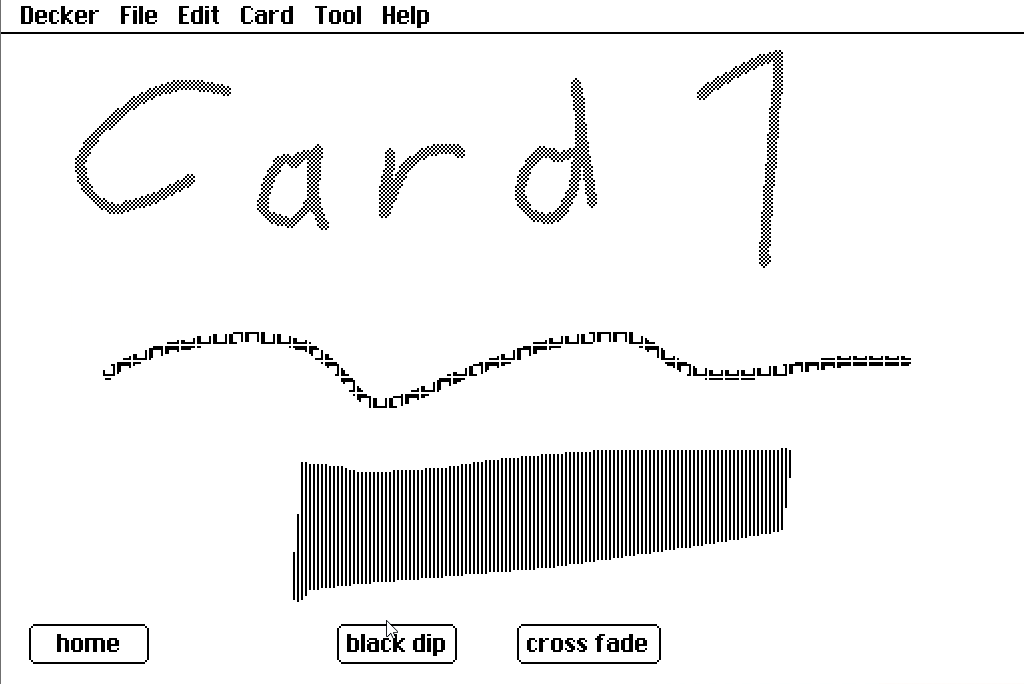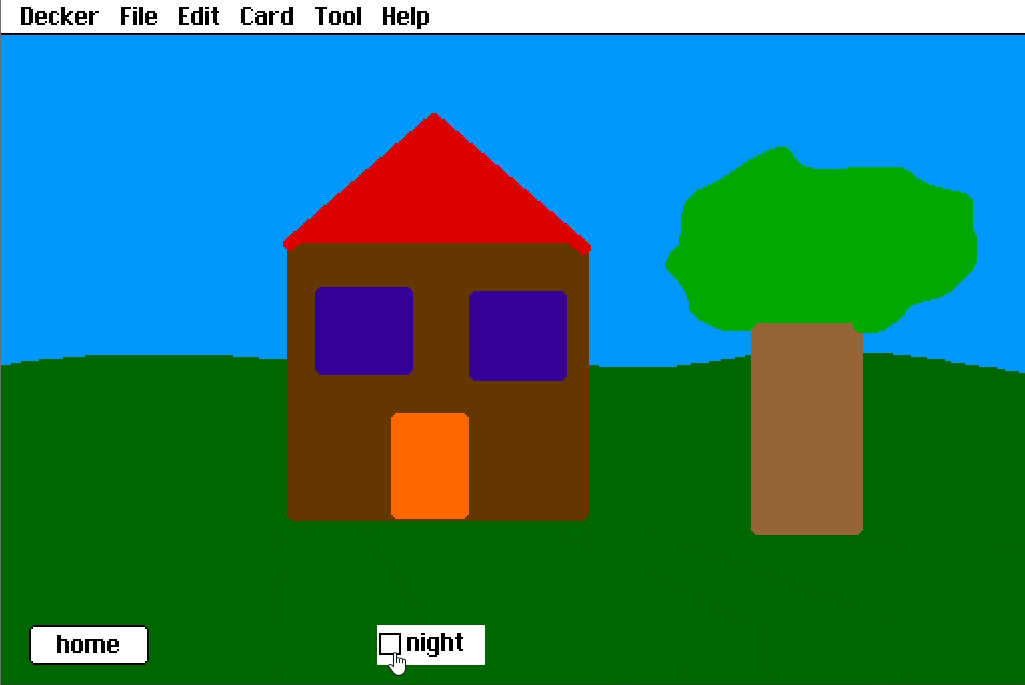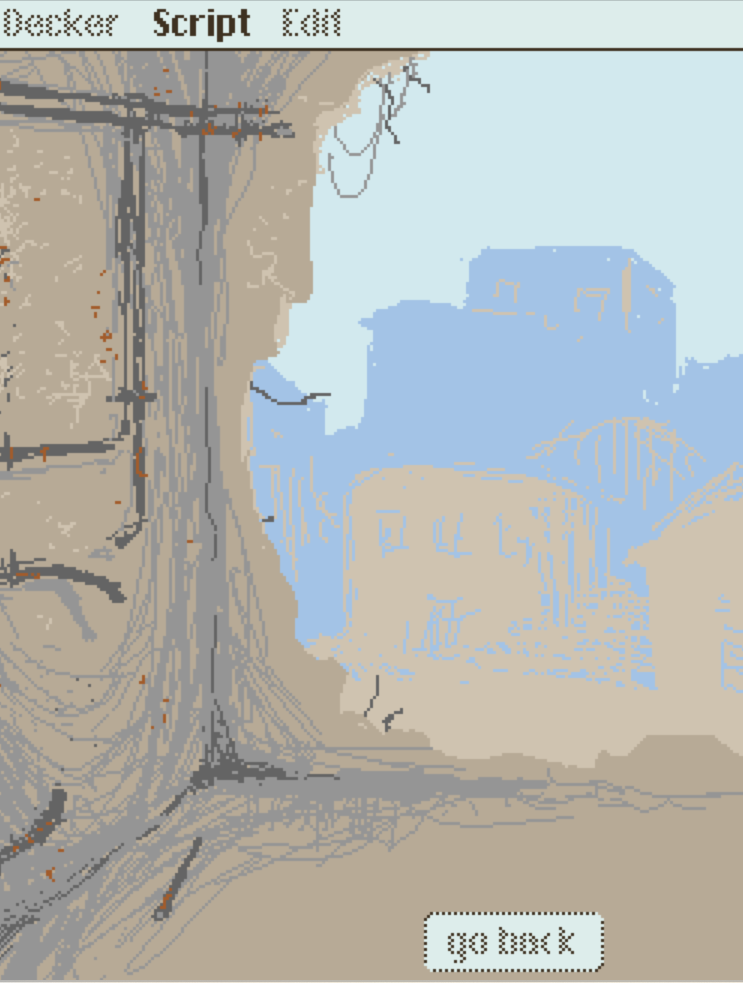I've worked up a Decker module that does a few fun tricks with fading between palettes! Check it out and let me know if you use it! https://micpp.itch.io/palettefade-module

I've worked up a Decker module that does a few fun tricks with fading between palettes! Check it out and let me know if you use it! https://micpp.itch.io/palettefade-module

Hi! I ran into an issue when using the palettefade function, i don’t know if i’m calling it incorrectly or if it’s related to how it interacts with other parts of the script(s).
This is the relevant part (i think) of the deck-level script (the palettes are also defined at this level, i don’t think they’re the culprit since everything worked fine when i only used setpalette):
#changes palette depending on the time of day
if t.value=1
pf.setpalette[deck morningpalette]
elseif t.value=2
pf.palettefade[deck morningpalette noonpalette 60]
elseif t.value=3
pf.palettefade[deck noonpalette sunsetpalette 60]
else
pf.palettefade[deck sunsetpalette nightpalette 60]
end
t:choice.widgets.time
#makes time pass(called after spending time at any location)
on timepass do
t.value:t.value+1
end
and this is the script of one of the cards where the problem occurs:
on view do
if !visited.value
visited.value:1
sleep[60]
dd.open[deck (r).speed:3]
dd.say[scripts.widgets.city.value]
dd.close[]
end
end
The card’s script seems to run correctly, but something weird happens when i click on the button (on the same card) with the following script:
on click do
timepass[]
dd.open[deck (r).speed:3]
dd.say["Let's go back."]
dd.close[]
if city_seen.value & beach_seen.value & forest_seen.value
go["night" "SlideLeft"]
else
go["choice" "SlideLeft"]
end
end
i think something goes wrong as soon as timepass[] is called, because right after clicking the button nothing seems to happen but the script keeps running, it just stays like this until i stop it manually:

Am i accidentally creating some sort of event loop (possibly with the animate event)? (?)
Thanks in advance! :>
Hi,
So I think the issue is having the pf commands in the root of the script instead of inside an event. I think what's happening is that when palettefade runs, it likely refreshes all the stuff in the root level script, which then gets itself into a loop where it's calling itself over and over. I'm not fully sure myself of the logic of when these are called, generally except for like setting constants (like palettes and such) I put all my logic inside events.
If you put the commands inside the "timepass" event, so that they're only called when this event is called, does that help?
Edit: so I did an experiment with the unlocked version of your deck and this seems to fix things. Remove the setpalette and palettefade commands from the root of the script and put them inside "timepass" like this
on timepass do t.value:t.value+1 if t.value=1 pf.setpalette[deck morningpalette] elseif t.value=2 pf.palettefade[deck morningpalette noonpalette 60] elseif t.value=3 pf.palettefade[deck noonpalette sunsetpalette 60] else pf.palettefade[deck sunsetpalette nightpalette 60] end end
Yup, i tried doing the same and it worked perfectly, thank you so much! ✿
Also true, having the logic inside an event seems much safer (especially against unintended consequences like the one i had before), i’m relatively new to programming/writing code but i seem to have a real knack for accidentally creating recursions or infinite rerenders :’D
Code you add to the deck-level script is run every time any event is processed. Likewise, code in a card or widget script executes whenever an event is sent to that card (or a widget on the card), or an event is sent to that widget, respectively.
If the top-level script is just defining functions (aka event handlers) and constants this is fine and normal. If there's lots of code it can start to chew up a lot of the per-frame execution quota; this is when you might consider moving some scripts into different cards or modules.
There are some situations where more elaborate "bare" code outside event handlers is useful, but Millie is correct: most of the time, most of your code ought to go inside event handlers so that it only has a chance to start doing things when a specific event occurs.
Makes perfect sense, thanks for clarifying! My galaxy brain thought “ah i’ll just put that one if-else in the top-level script so it can constantly and automatically check for the time”, but i definitely see how this kind of uncontrolled approach could very easily backfire, i’ll keep it in mind for the future :)
So you'd probably be able to make an effect like this by using the main "palettefade" function as well as the "setpalette" function. Basically set up a red palette, cut to it instantly, and then slowly fade back to the normal palette. Something like this - I've commented to explain what each bit does
#set up the two palettes we need, one normal and one red redpalette:(16711680,16711680,16711680,16711680,16711680,16711680,16711680,16711680,16711680,16711680,16711680,16711680,16711680,16711680,16711680,16711680) normalpalette:pf.currentpalette[deck] pf.setpalette[deck redpalette] #make screen red go["card1"] #go to the next card #could add a wait step here if you want to hold on red for a bit before fading back pf.palettefade[deck redpalette normalpalette 30] #fade back to normal
I hope this makes sense! You can tweak it to go to different colours or fade faster or slower if you want - and there's no requirement to necessarily change cards, if you leave out the go statement you can have it as like an effect on the current card (e.g. in the middle of another script)